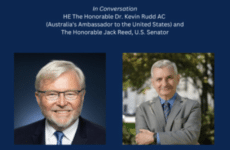By: Steven Bianco
Posted In: News
President Obama is trying to promote a view of his foreign policy by making an unexpected visit to U.S. military forces in Afghanistan. According to ABC News, the President’s arrival in Kabul marks one year and two days since 30,000 more U.S. troops were committed to Afghanistan in a counteroffensive surge posed by the Obama Administration against all Taliban and Al-Qaeda elements in the country. “You will succeed in your mission,” said Obama before an audience of 3,850 U.S. servicemen and women, not long after landing at Bargram Air Field in Parvan Province, Afghanistan. “We said we were going to break the Taliban’s momentum, and that’s what we’re doing.”
Over the course of his stay in the war-torn country, The President intends to speak on present U.S. as well as NATO objectives and counterinsurgency progress with General David H. Petraeus.
Since the war in Afghanistan began, 1,300 U.S. soldiers have been killed. Since the beginning of his tenure, Obama has increased troop levels in the country to 100,000 according to the New York Times. The Obama Administration’s policy on improving the economy has received much flak, an equal amount of questions have come about on whether or not the United States has proven successful in thwarting terrorist and insurgency activities in Afghanistan. In terms of recent casualties, 45 U.S. troops were killed in November 2010, labeling it the most deadly month for the U.S. since the war had begun in 2001. According, to the CNSNEWS.com’s database of U.S Casualties in Afghanistan, the United States military suffered 452 combat and non-combat related deaths this year. A question that could be raised by many individuals is “is the price worth it?” Last week, the Pentagon released its semiannual report to Congress on the Afghanistan conflict, “Progress Towards Security and Stability in Afghanistan.” The report said that sectarian violence in that nation, as well as political malfeasance has become inflated.
However, Major General Richard Mills, serving in Afghanistan’s Helmand Province where progress has been recognized, bears a different view. “I think we are beginning to be the beneficiaries of this surge,” stated Mills in an interview with Renee Montagne on NPR News on Dec. 2. “I think we’re saying very, very satisfactory progress across the board.” Regarding the continued prevalence of U.S troops among Afghani communities in relation to the President’s plan to begin withdrawing U.S. forces from Afghanistan in the summer of 2011, Mills said, “I can tell you about the town of Nawa, in which there’s little overt presence anymore of the Marines in the streets. And much of the security responsibility has been taken over by the Afghan police.” Yet in the town of Sangin, also in Helmand province, fighting between U.S. Marines and insurgents has proven “fierce” and has been noted by some as the deadliest in the entire war. On this, Mills said, “It’s been tough fighting. It continues to be tough fighting. And we are going to remain focused on that mission up there, and we will win.”
Observing the difficulties and challenges in establishing greater peaceful stability among Afghanistan’s provinces, the Obama Administration as well as Afghani President Karzai have begun to place great importance on the year 2014, when the United States is expected to hand over civil control to the Afghan government. Aside from Obama’s reassurance that the U.S. and U.S. allies will most likely prevail in crippling Taliban and Al-Qaeda in a divided Afghanistan, Americans themselves have begun to express their opinions. In a USA TODAY/Gallup Poll released this past week, 54 percent of Americans believe that not much has been achieved in Afghanistan by U.S. forces over the past year. Also according to this poll, four out of ten Americans said they believe troops should be withdrawn sooner from the ravaged country. Despite conflicting viewpoints, whether or not the United States can work effectively over the next four years or so to eradicate the Taliban, suppress Al-Qaeda and provide a stable environment in which the Afghani government can take hold of their country remains to be seen.














